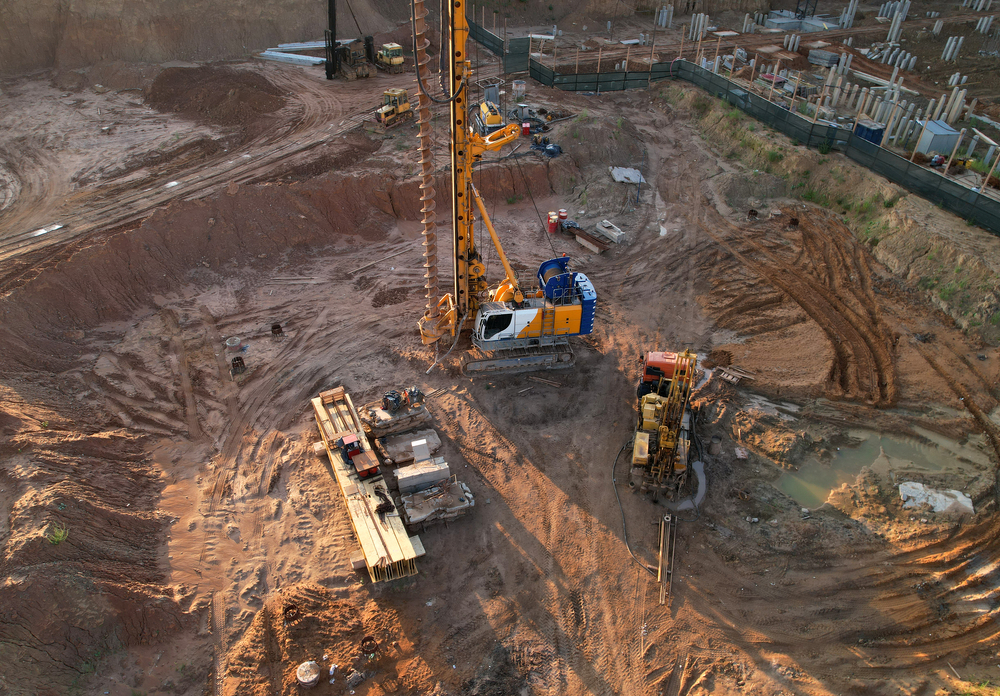About Geotheta
About Geotheta
Blog Article
Not known Facts About Geotheta
Table of ContentsThe Single Strategy To Use For GeothetaEverything about GeothetaGeotheta Things To Know Before You BuyOur Geotheta DiariesGetting The Geotheta To Work

They conduct website examinations, accumulate samples, carry out laboratory examinations, and evaluate data to evaluate the suitability of the ground for construction tasks - Geo Tech Engineer. Based on their findings, geotechnical engineers offer suggestions for foundation design, slope stability, keeping structures, and mitigation of geotechnical hazards. They collaborate with other professionals, such as architects, architectural designers, and construction teams, to make certain that geotechnical considerations are integrated into the overall job design and implementation
By evaluating the behavior and buildings of dirt and rock, they can determine prospective geotechnical hazards such as landslides, dirt negotiation, or slope instability. Their experience assists stop failures or accidents that could endanger lives and building. Right here are some detailed obligations and duties of a geotechnical engineer: Site Examination: Geotechnical engineers conduct website investigations to collect data on subsurface problems.
They interpret the information to recognize the buildings and actions of the dirt and rock, including their stamina, permeability, compaction characteristics, and groundwater problems. Geotechnical Evaluation and Layout: Geotechnical designers examine the information collected during website examinations to analyze the security and suitability of the website for construction tasks. They do geotechnical computations and modeling to assess variables such as bearing ability, settlement, incline security, lateral planet pressures, and groundwater flow.
The smart Trick of Geotheta That Nobody is Talking About
Foundation Design: Geotechnical designers play a critical function in designing foundations that can securely support the designated framework. They evaluate the dirt problems and load needs to determine the proper foundation type, such as superficial structures (e.g., grounds), deep foundations (e.g (https://pxhere.com/en/photographer/4325446)., heaps), or specialized strategies like dirt improvement. They think about variables such as settlement limits, birthing ability, and soil-structure communication to develop optimal structure styles
They review construction strategies, screen website tasks, and carry out field assessments to verify that the layout suggestions are followed. If unanticipated geotechnical issues develop, they evaluate the scenario and offer referrals for remediation or adjustments to the style. Risk Evaluation and Reduction: Geotechnical engineers examine geotechnical hazards and risks related to the job website, such as landslides, liquefaction, or dirt disintegration.

Cooperation and Communication: Geotechnical designers function carefully with various other professionals entailed in a task, such as architects, structural designers, and construction groups. Effective communication and collaboration are important to incorporate geotechnical factors to consider into the overall job design and building process. Geotechnical designers provide technological know-how, response questions, and make certain that geotechnical needs are met.
All About Geotheta
Here are some kinds of geotechnical engineers: Foundation Designer: Foundation engineers focus on developing and analyzing structures for frameworks. They analyze the dirt conditions, load requirements, and site characteristics to identify the most suitable foundation type and design, such as shallow foundations, deep foundations, or specialized strategies like heap structures.
They assess the aspects affecting incline security, such as soil homes, groundwater conditions, and slope geometry, and develop strategies to avoid incline failings and mitigate dangers. Earthquake Engineer: Quake designers specialize in examining and designing structures to endure seismic forces. They analyze the seismic danger of a website, review dirt liquefaction capacity, and establish seismic design standards to make certain the security and durability of structures throughout quakes.
They carry out field testing, collect samples, and evaluate the collected information to identify the soil properties, geologic formations, and groundwater problems at a site. Geotechnical Instrumentation Engineer: Geotechnical instrumentation engineers concentrate on surveillance and determining the habits of soil, rock, and structures. They install and keep instrumentation systems that check aspects such as dirt settlement, groundwater degrees, slope motions, and architectural displacements to assess performance and offer early warnings of potential issues.
The smart Trick of Geotheta That Nobody is Discussing
They conduct examinations such as triaxial examinations, combination tests, straight shear tests, and leaks in the structure tests to collect data for geotechnical evaluation and design. Geosynthetics Engineer: Geosynthetics engineers specialize in the layout and application of geosynthetic products, such as geotextiles, geogrids, and geomembranes. They make use of important link these products to improve soil security, enhance slopes, provide water drainage options, and control disintegration.
They tend to be investigative people, which means they're intellectual, introspective, and curious. They are interested, methodical, sensible, logical, and sensible. Some of them are additionally social, suggesting they're kind, generous, cooperative, individual, caring, practical, empathetic, sensible, and pleasant. Does this seem like you? Take our complimentary occupation test to discover if geotechnical designer is just one of your top job suits.
In the office environment, geotechnical designers utilize specialized software tools to do estimations, produce styles, and analyze information. They prepare records, review task specs, communicate with customers and staff member, and coordinate job activities. The workplace setting offers a favorable setting for study, analysis, and collaboration with various other experts entailed in the project.
4 Easy Facts About Geotheta Described
They regularly check out project websites to carry out site investigations, examine geotechnical conditions, and gather data for analysis. These visits include taking a trip to various locations, occasionally in remote or tough terrains. Geotechnical engineers might carry out dirt tasting, conduct examinations, and screen building and construction activities to guarantee that the geotechnical aspects of the job are being applied correctly.
Geotechnical designers additionally function in specialized geotechnical research laboratories. Geotechnical research laboratory designers function extensively in these atmospheres, handling screening tools, running instruments, and videotaping information.
Report this page